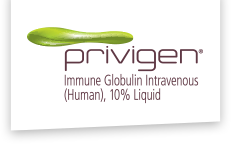Important Safety Information
WARNINGS:
- Thrombosis (blood clotting) may occur with immune globulin products, including Privigen. Risk factors may include advanced age, prolonged immobilization, a history of blood clotting or thick blood, use of estrogens, installed vascular catheters, and cardiovascular risk factors.
- In predisposed patients, kidney malfunction and acute kidney failure, potentially fatal, can occur with the administration of human immune globulin intravenous (IGIV) products. Kidney problems occur more commonly in patients receiving IGIV products that contain sucrose. Privigen does not contain sucrose.
- If you are at high risk of thrombosis or kidney problems, your doctor will prescribe and administer Privigen at the minimum dose and infusion rate practicable, and will monitor you for signs and symptoms of blood clots and blood thickening, as well as kidney function. Always drink sufficient fluids before administration.
See your doctor for a full explanation, and the full prescribing information for complete boxed warning.
Treatment with Privigen might not be possible if your doctor determines you have too much proline in your blood, or if you are IgA-deficient with antibodies to IgA and a history of hypersensitivity. Tell your doctor if you have previously had a severe allergic reaction (including anaphylaxis) to the administration of human immune globulin. Inform your physician if you notice early signs of an allergic reaction after administration of Privigen, including hives, rash, tightness of the chest, wheezing, or low blood pressure.
Immediately report to your physician the following symptoms, which could be signs of serious adverse reactions to Privigen:
- A decrease in urine output, sudden weight gain, fluid retention/swelling, and/or shortness of breath following infusion (possible symptoms of kidney problems)
- Pain and/or swelling of an arm or leg with warmth over the affected area, discoloration of an arm or leg, unexplained shortness of breath, chest pain or discomfort that worsens on deep breathing, unexplained rapid pulse, numbness or weakness on one side of the body, as these could be signs of a blood clot
- Severe headache; a stiff neck; drowsiness or fatigue; fever; sensitivity to light or painful eye movements; nausea and vomiting; increased heart rate; yellowing of the skin or eyes, and/or dark-colored urine(possible symptoms of other conditions that may require treatment).
- Severe breathing problems, lightheadedness, drops in blood pressure, and fever, which may suggest trasnfusion-related acute lung injury (a condition typically occurring within 1 to 6 hours following transfusion)
Privigen is made from human blood and may contain infectious agents that could cause disease (for example, viruses and, theoretically, the Creutzfeldt-Jakob disease (CJD) agent and its variant (vCJD)). The risk that PRIVIGEN may transmit an infectious agent has been reduced by screening plasma donors, by testing donated plasma for certain virus infections, and by inactivating or removing certain viruses during manufacturing.
Before receiving any vaccine, tell the immunizing healthcare provider if you have had recent therapy with Privigen, as the effectiveness of the vaccine could be compromised.
In clinical trials of Privigen, headache was the most common side effect seen in all conditions treated (PI, ITP, and CIDP). Other common side effects that can be seen with treatment include:
- PI – Fatigue, nausea, chills, vomiting, back pain, pain, elevated body temperature, abdominal pain, diarrhea, cough, stomach discomfort, chest pain, joint swelling, flu-like symptoms, pain in the throat or voice box, rash, and dizziness.
- ITP – Laboratory findings consistent with red blood cell destruction, elevated body temperature, low numbers of healthy red blood cells, nausea, and vomiting.
- CIDP – Physical weakness or lack of energy; high blood pressure; nausea, pain in arms, legs, hands or feet; the breakdown of red blood cells, flu-like symptoms, abnormally low white blood cells, and rash.
These are not the only side effects possible; see the full prescribing information for a complete list of adverse reactions possible with treatment for each condition. Alert your physician to any side effect that you may experience.
Indications
Privigen®, Immune Globulin Intravenous (Human), 10% Liquid, is approved to:
- Treat types of primary immunodeficiency (PI).
- Raise platelet counts in patients aged 15 years or older with chronic immune thrombocytopenic purpura (ITP).
- Treat chronic inflammatory demyelinating polyneuropathy (CIDP) in adults. Talk with your doctor about the length of your therapy.
For more information about Privigen, please see full prescribing information.
You are encouraged to report negative side effects of prescription drugs to the FDA.
Visit http://www.fda.gov/medwatch, or call 1-800-FDA-1088.
You can also report side effects to CSL Behring's Pharmacovigilance Department at 1-866-915-6958.
